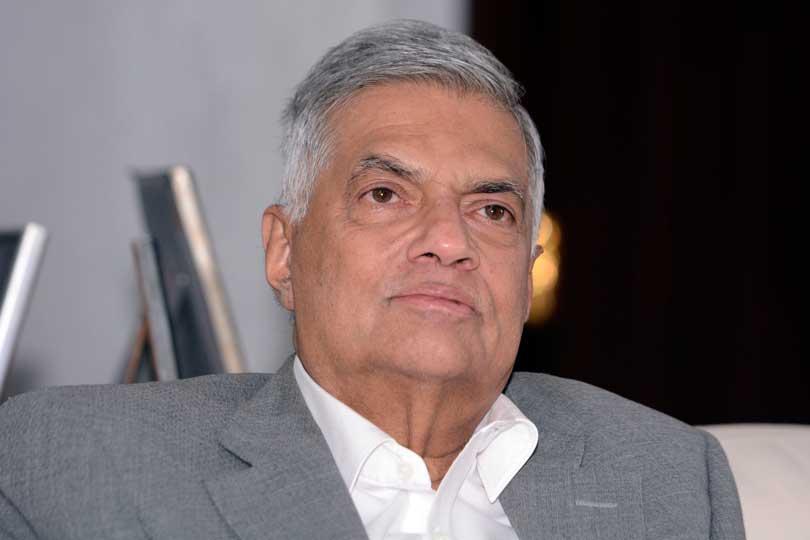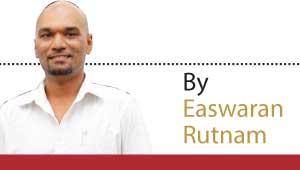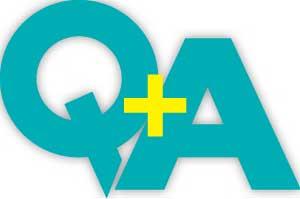Reply To:
Name - Reply Comment

Pic by Pradeep Pathirana
- Crisis is completely new. Not only here but in the rest of the world also the oppositions are active in giving out their viewpoints
- We would like the government to succeed. That is why we are asking for testing
- How can we expect a globalised trading system or a semi-globalized economy to operate when there is no leadership?
As Sri Lanka fights the Coronavirus a different sort of battle is beginning to build. A battle between the Government and the opposition reconvening parliament to pass new laws to address the current crisis in  the country.
the country.
President Gotabaya Rajapaksa has already indicated he will not reconvene the old parliament and instead Prime Minister Mahinda Rajapaksa has called for a meeting with former MPs today (Monday) which some former MPs have said they will boycott.
Leader of the United National Party, former Prime Minister Ranil Wickremesinghe meanwhile told Daily Mirror that now is not the time to play adversarial politics.
He said that his party is pushing for new lockdown laws to address the issue in the country.
Excerpts:
 Q Mr Wickremesinghe, what is your take on the current situation in the country with regards to the Coronavirus?
Q Mr Wickremesinghe, what is your take on the current situation in the country with regards to the Coronavirus?
The problem is that the countries which have really been able to have some grip on it have done extensive testing. Germany was doing a hundred thousand a day. South Korea did 20,000 a day. We are half the population. We don’t have the capacity, England is trying to bring in testing. I think Italy has started. It will be necessary, especially if you want the economy to function and there should be a gradual easing of the lockdown. But that can be done only if there is testing and then you look at the areas where the virus is low. You go ahead, you use the lockdown and then if there is any sign of the virus catching on, you put it in again. Otherwise, there would be panic. So we do recommend that you do the testing and at least start with 3,000 and build it up. You have to get the equipment from abroad, you have to get the masks from abroad. We don’t have enough from what I understand, but this is the approach that has been suggested.
Q But looking at what President Gotabaya Rajapaksa has done and considering that it seems, it is undercontrol. Would you say that what this government has done so far is commendable?
I must say the President, the health services and the security services all worked out and got a good lockdown. It was not like European countries where people were going out. But you have two more stages. Once you have a lockdown, then you have to ease the lockdown and that requires to see the numbers go down and that is dependent on testing.
Now I think during the second stage they would be judged on how they test and whether they can get all this equipment that is required from a large amount of 500,000 to one million testing kits onwards. We would like the government to succeed. That is why we are asking for testing. Then the third one, this pandemic is not only a health-related issue, but it is also economy-related. For the first time, all economic activity has come to a halt. So the question is how do we restart economic activity here?
How do we handle it? Because we have to depend on exports, on overseas employment, and tourism. On the other hand, we have a balance of payment crisis. So that’s the third one. Each hurdle is higher than the other. The first hurdle has been cleared. Now you’ve got to go onto that second hurdle and from there go to the third one. As far as we are concerned, we are willing to help the government because this is not a time to play adversarial politics. So we have to see how the different parties can work together with the government.
Q But what kind of help can you give the government?
It is a question of what the government and we can agree on. So far the government hasn’t asked for anything, but then we can say where they are good and also point out where we think far more work has to be done. For example, the 5,000 rupees that’s given out on a political basis. So on that one, we did take the issue up and there have been results in some areas. The politicization does not in any way help us.
Q But if one were to say, look, the government seems to be handling things on its own, why does it need your support or the support of the opposition? How would you respond to that?
This is a national crisis we have not seen before. We have seen disasters. We have seen internal turmoil, where there had been a World War when we were a colony. Here, you don’t know what you’re fighting. Earlier people knew they were either facing the Spanish Flu or SARS or HIV. But this is a completely new situation. Not only here but in the rest of the world also the oppositions are active in giving out their viewpoints.
"To discuss some of the major issues, it may be necessary for parliament to convene, but in an informal way. You have only about 20 members who are selected by the Speaker on the proportion to the members present"
Q You spoke a bit earlier on what you would expect this government to do. Would you say that the government, maybe, acted a bit too late in addressing this issue? This issue had been raised a couple of times, I believe in parliament as well in January and February. Do you think that the government should have done it earlier than it had done?
Well, the government acted at a time a pandemic was declared. So within the WHO standard, they have acted. But some governments acted early. And I think we should have done that, in my view.
Q In one of your recent interviews with an Indian television station, you had mentioned that someone needs to take the lead role in addressing this issue. But when we look at world powers like the US and China fighting among themselves and the World Health Organisation, caught in between, who do you think can really step in?
Well, I would say you need global leadership. The pandemic is global. So, how do we counter it? For instance, look at the big problem we have of obtaining masks. How a wild market operates on it. The second is the economic consequence of the pandemic, which is affecting every economy in the world. So these require global discussions. During the global financial crisis of 2008, President George W. Bush in his last few months in the office called the G20. He held a meeting and they came up with a plan. And after that, though he gave up his office, Gordon Brown and others took it forward. So, they had some plans. Right or wrong, they acted. On the issue like climate change, there has been a global leadership. On things like the piracy off the Horn of Africa, people have acted. So in this instance, there has been no global leadership. How can we expect a globalised trading system or a semi-globalized economy to operate when there is no leadership? I think it is up to the main countries to decide how they are going to have you on. We need the USA, we need China and everyone has a minimal level of understanding. As far as the WHO is concerned, the USA has made certain allegations against the Director-General. That can be investigated. But I don’t think the WHO should be the victim of that inquiry.
Q So you would say the decision by the US to suspend funding for the WHO is not the right move at this moment?
No. The step they could have taken was to ask for an inquiry or for an explanation. This is a case where you are in politicising the issue. Then what happens? The research gets politicised in turn and it is the world that suffers. The researchers are doing a wonderful job though they may not have got the final results.
Q And there is also talk of the need to ensure accountability over where this virus started and how this spread across the globe and so on and so forth. Do you think that is something that needs to be looked into at this moment?
It has to be looked into, but I think that is not the priority. The question of coming in from a Wuhan lab has been ruled out by many. Some say it started in Wuhan, some say in Southwest China borders. So, there are many different theories. All that has to be looked into. Secondly, it is the time taken to report it. In the case of China, whether there was a deliberate delay or not. But there had been a delay on the part of so many countries. Even the USA, the UK. Many countries did not act. When China got the virus many European countries thought it was a Chinese affair and that it won’t affect them. But they have been hit. They have been hit worse than even China.
"More than that I think it is the non-publication of newspapers and unofficial censorship that you all have. And, what some of you seem to be observing quite happily is the one that gives rise to it. It is not so much of the army saying don’t get onto the road. I think it is the media that has to decide what free atmosphere they are going to create"
Q Don’t you think we also fell into that trap, assuming that this is something that will be limited to China?
Yes, I think that’s what happened. And a lot of people say that we may be on the next stage of the virus peaking. It is been to China, it is been to Europe, it has been to the US and now it will come here to our part of the world.
Q With the opposition calling for parliament to reconvene to address this issue, some are of the opinion that this would sort of scuttle the ongoing efforts to contain the virus in Sri Lanka politically or otherwise. Would it become such an attempt?
No, any attempt to reconvene parliament will not be such an attempt. I am of the view and my party is of the view that parliament meeting should not be the conventional way. You should not be meeting four times a week. People are fed up of that I must say. And they don’t want politics to take priority here. To discuss some of the major issues, it may be necessary for parliament to convene, but in an informal way. You have only about 20 members who are selected by the Speaker on the proportion to the members present. And, you must try and sort of concluding everything in an hour. If they are worried about live broadcasting, it can be done later. The issues must be discussed and parties must come together. As far as the UNP is concerned, we think that the country requires a lockdown law. You can’t operate it only with, the curfew, which many people feel is not legal but are not challenging it at the moment. Lockdown laws will still allow some activity around your house without having a curfew. Also do not allow people to go out. Then compulsory testing has to be done. Then you have to define the powers of the Police and the armed forces regarding helping out on these issues for them.
New laws have been passed even by the UK and the European countries. They have Quarantine Laws, which they have updated even up to a few years ago, but they found it is not enough. So we can act on that. I feel we need it, but then that’s a short process. About 15 minutes in Parliament on one day and one hour thereafter. hoping that no one challenges it in the Supreme Court so that, that is different. There are also Constitution issues. Can we go on without parliament after three weeks? So I think it is better that we meet in private, the government and the opposition and try to settle it. I don’t think we should allow this to become a big controversy when we have so many other things to do and people’s lives, their food, their health, their income, all of that to look into.
Q But you’ve already had meetings with the President and discussed some of these issues, haven’t you?
It was with the Prime Minister and that too on the measures that were taken initially.
Q But with the President now clearly ruling out any chances of the old parliament reconvening, what next?
So we have to meet with him and talk about the constitutional crisis and how to avoid it.
Q With elections now being set for June 20th, do you feel that the environment is conducive to be preparing for an election?
Well, the Elections Commission must decide. But, I don’t think so. The numbers have increased, so I don’t think we are in that position.
Q Do you think Sri Lanka can actually recover from this? I mean, we’ve suffered after the Easter attacks and now with this as well, do you think that the economy can recover once again?
The economy was picking up after the Easter attacks. Our main issue was really with tourism and investor confidence returned. But this is not only about Sri Lanka. The whole trading system is messed up. Our markets are not functioning. As you say, the buyers are not functioning. The consumer, they’re not functioning because the economies have come to a halt. They can’t market. They are not earning money to buy. And similarly, the producers and the manufacturers are suffering because their systems are not working and ship lanes are not flying. So at both ends, nothing is happening. So how do you start it? And this year there won’t be money. IMF forecast at the moment it’s growth will return next year. I do not know. If this goes on for longer this year it will affect growth next after. So these are some of the issues that we have to face.
Q And is there a need for, like in 2015, the formation of a Unity Government to take the country forward. Is that something that even you are thinking of?
No, we are not taking up the question of a unity government. I don’t think the government will also be interested in that. It is a question of how do we work. Because in this system you can’t have the normal adversarial politics. That’s recognised in many, many countries. Then how do we workaround? The government must have a plan. It can come out with a health plan, an economic plan and discuss the plan.
Q There is also a concern that this whole process of addressing the Coronavirus has been militarised.
Well, I think using the armed forces at the first stage was useful, but there was a lot of the civil administration that was not utilised. But the second stage cannot be, I mean basically, it is not a military stage, it is a health stage. The military can help. The third stage is the economic stage. I can’t see the military wanting to get involved or having the ability. So you need all these, you need the civilian administration. The civil administration was not fully utilised initially. Now it is coming into action. We have a very good district administration system.
But, more than that I think it is the non-publication of newspapers and unofficial censorship that you all have. And, what some of you seem to be observing quite happily is the one that gives rise to it. It is not so much of the army saying don’t get onto the road. I think it is the media that has to decide what free atmosphere they are going to create.